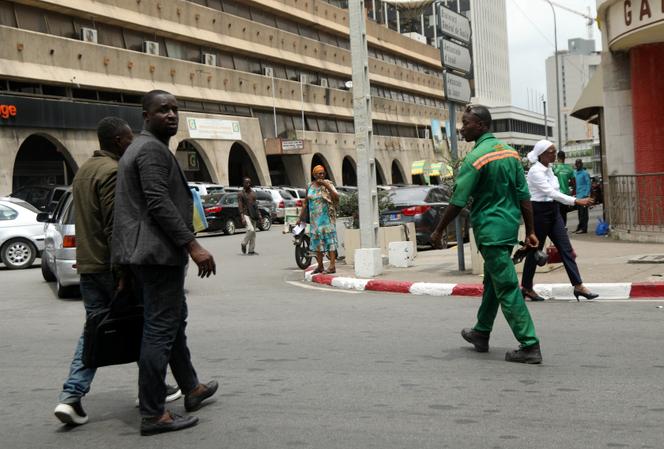


"You leave the Pharmacie du Golf on your right, turn left at the crossroads, then go past the former Leader Price store; it'll be at the second set of traffic lights near the scrubland and the fruit sellers." In Abidjan, giving your address to a craftsman, deliveryman or friend is often a tracking game. This is one custom that Ivorian authorities are hoping to reform thanks to the major addressing project (changing street names and creating addresses) initiated in 2017 and due to end next year.
Initially, 34 streets and 211 avenues in the economic capital will be affected. The list was presented to the Council of Ministers and unveiled on July 24 by Bruno Koné, Minister of Construction, Housing and Urban Planning, in a lengthy interview with Fraternité Matin, Côte d'Ivoire's largest state-controlled newspaper. To ward off criticism, the Minister stressed that the thoroughfares and their names were selected based on a proposal from a college of experts and local figures "who have no reason to be complacent in the mission entrusted to them."
Many observers, however, were quick to point out the over-representation of politicians on the list: presidents, opponents, ministers (from former or current governments) and figures who have marked the political, military, cultural and sporting history of Côte d'Ivoire. Great emphasis has also been placed on values such as solidarity, freedom and hospitality.
As a result, French presidents Valéry Giscard d'Estaing and François Mitterrand have lost their streets, and have replaced respectively by the first Ivorian president, Félix Houphouët-Boigny, and writer and politician Germain Coffi Gadeau (on one segment of the road), and the first lady, Dominique Ouattara (on the second segment). The ministry tasked with this change assured us that this move follows the advice of Ivorians and has "no political overtones." Boulevard de France has therefore become Boulevard Marie-Thérèse-Houphouët-Boigny, named after the wife of the father of independence. Boulevard de Marseille will henceforth be called Boulevard Philippe-Yacé, after one of the founders of the Ivorian republic who lived on this street.
According to the Ministry of Urban Planning, another list of 2,500 street names is due to be announced in the next few days. It has already been approved by the Council of Ministers. A further 5,500 will follow in the coming months. In all, 14,000 routes will receive addresses.
The project, which is financed by the World Bank to the tune of $15 million (around €13.6 million), aims to provide an address for residents and business in Abidjan's 13 districts. In a city of six million inhabitants, this is no mean feat. Initial addressing was carried out during colonial times, followed by a few street names and so-called alphanumeric codes (B25, L231...) for the axes of the main districts under the presidency of Henri Konan Bédié (1993-1999). But the project "never managed to take root in the collective memory," said Koné.
Following preliminary studies launched in 2017, the Bureau National d'Études Techniques et de Développement (the National Office of Technical Studies and Development, BNETD) was made responsible for implementing the project. Surveyors are crisscrossing the city, photographing and referencing every house and dwelling, even those under construction. According to the Ministry of Urban Planning, more than half of the economic capital has already been covered, and some addresses will be operational "before the end of the year."
On a day-to-day basis, addressing is supposed to improve guidance and circulation of people, but also of public and emergency services, e-commerce and mail distribution companies. "We're also going to see an increase in bank credit," said economist and teacher-researcher Séraphin Prao. "Without an address, banks are reluctant to grant loans. When you make an application, you have to specify where you live, but what proof is there that this person lives on this street? With addressing, the banker can check and this will reduce banking risk."
The gain should be significant for the state in terms of tax policy. "In Côte d'Ivoire, the collection rate is low," said Prao. "Due to fraud, the tax burden is only around 15%. But with street addressing, coupled with the housing census, we'll know who lives where, what the person does and what they can give to the state. So, it will be easier to collect taxes and improve tax revenues."
Will all streets be affected? For geographer and lecturer Gilbert Yassi, a specialist in urban services in sub-Saharan Africa, there's a risk that poor neighborhoods will be neglected. The ministry concedes that these ever-changing districts are still too poorly structured (located in flood-prone areas, or made up of chaotic streets and houses...) to be referenced. "The addressing project is leaving these people on the sidelines," lamented the researcher. "But we must make sure they have a legal address. This is crucial, otherwise it's going to drive a wedge between people who live in the same city."
Translation of an original article published in French on lemonde.fr; the publisher may only be liable for the French version.
